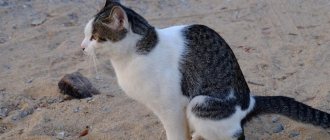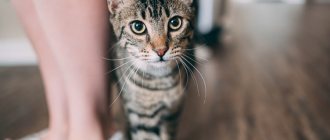Do you have a smelly cat? Cats are generally known for being clean. Most of them are fastidious self-portraits of hairdressers, which keeps them away from dirt and odors. However, sometimes you may find that your cat smells bad. While some cat odors are harmless or easy to fix, others may indicate a health problem.
About cat smell
A healthy and well-groomed cat does not have a pronounced, specific odor. What is commonly called “cat spirit” is the smell of urine - pungent and occurring in the absence of regular cleaning of the room and compliance with hygiene standards. Here the culprit can be considered not the cat itself, but its owner.
If an unpleasant odor begins to emanate directly from an animal that is being monitored and properly cared for, then the reason most likely lies in certain diseases characteristic of representatives of the cat family.
The cat is a hunter, a predator by nature. Therefore, these animals are extremely clean and ensure that there are no foreign odors.
An unpleasant odor should not occur even when your pet's fur gets wet.
Preventive measures
It is much easier not to deal with the consequences of the problem, but to eliminate the cause of the unwanted aroma in the house. First of all, make sure that your pet is in good health and psychological condition. It is advisable to consult a veterinarian.
When caring for an animal, follow the rules:
- Choose your cat's litter box wisely. It should be 1.5 times longer than the pet's body.
- Install the toilet in a place that is comfortable for the animal. The cat will relieve itself in the litter box provided it is quiet and comfortable. Do not place the toilet next to the door, on an unheated balcony. The noise of household appliances can also scare away a cat.
- Make sure the litter is suitable for your cat. Do not use options with a strong aroma.
- Remember to clean regularly. Cats are clean animals who will not go to an unclean toilet twice in a row. Excrement and contaminated litter must be removed immediately.
The frequency of replacing the filler depends on its type. The absorbent one is changed every 2 days, the clumping one is changed every week. Silica gel ones are completely replaced 2 times a month.
Keep a close eye on your pet's health, pay attention to it, and practice good hygiene to prevent the development of a delicate problem.
Main reasons
According to veterinarians, the reasons that provoke the appearance of a specific, unpleasant odor from a domestic cat are:
- Fungus - affects the perineum and armpits, groin area. You can suspect the presence of a fungal infection by such accompanying signs as redness and peeling of the skin, itching.
- Infections of bacterial origin - may be accompanied by severe itching, redness of the skin, hair loss, and the formation of pustular formations.
A bad odor can come from under the animal’s tail, from its ears or mouth. It is important for a caring owner to carefully examine his pet to find out the causes and location of the unpleasant odor.
Wool and skin
The most common source of pungent odor is the skin and fur of baleen tabbys. The reasons may be:
- Puberty . This problem is most common among owners of young animals, which during puberty begin to produce increased amounts of hormones in order to attract a partner. As a result, the pet's fur begins to emit a pungent odor. And besides, the cat may well begin to “mark” the territory. Proper castration or proper care of the animal after breeding will help solve the problem. If a decision has been made to castrate a cat, it is recommended to do this before puberty is completed, so that the habit of leaving “fragrant” marks does not become a habit for the animal.
- Parasites and infections. If your pet begins to shed too often, its fur looks matted and unkempt, and also emits an unpleasant odor, then perhaps we are talking about fungal, bacterial infections of the skin, the presence of ticks or helminths. In such a situation, the best solution would be to go to a veterinary clinic and undergo the treatment course prescribed by a specialist.
Oral cavity
Acrid, unpleasant breath is also a widespread phenomenon among felines. This symptom may indicate:
- dysfunction of the digestive system;
- diseases of the gastrointestinal tract;
- pathologies of the genitourinary system.
In addition, a “bad odor” from the oral cavity can occur due to chronic diseases or dental ailments.
Inspection by the owner of the purr's mouth. It is important to initially examine your pet's mouth.
A healthy cat's gums look firm and pink in color, and her teeth appear flawlessly white.
If the examination does not yield results and the animal’s oral cavity looks healthy, but its breath is harsh and stale, then the reason may lie in diseases of the gastrointestinal tract or in the cat’s improper diet.
What to do. If you notice any alarming symptoms, you should consult a veterinarian as soon as possible, because any pathology is easier and more likely to be treated in the early stages of its development. The only exception is kittens. When babies erupt molars, specific hoods often form in the gum area, under which food can get trapped. As food rots, it begins to emit an unpleasant aroma and can provoke the development of inflammatory processes. This condition also requires medical intervention.
Preventive measures. As for prevention, experts recommend that cat owners monitor oral hygiene, promptly remove tartar, and introduce fiber or cleaning food into the diet, which can be purchased at any pet store.
Also watch the video of an unpleasant smell from a cat’s mouth, the main reasons:
Ear smell
Quite often, an unpleasant odor comes from the ears of cats. The ears of these animals are covered with sensitive skin that secretes increased amounts of wax and lubricant. When the functioning of the mucous membranes and glands is disrupted, the level of secretions produced increases significantly, which can lead to the appearance of an unpleasant odor. The problem can be caused by:
- Food allergy . A similar condition occurs when feeding an animal with baked goods, muffins, sweets and smoked meats, which disrupt the functioning of the skin and lead to hyperactivity of the ear mucous membranes.
- Otitis and inflammatory otolaryngological diseases . Pathologies develop against the background of hypothermia, traumatic injury, and bacterial infections. The disease can be detected by the restless behavior of the pet, caused by pain, redness and hyperemia of the skin of the auditory organs.
- Ear mite . As for infection with ear mites, owners can detect this disease by carrying out regular hygiene procedures and examinations of the pet. When infested with mites, a pronounced brown coating forms on the skin and mucous membranes of the cat's ears. If this symptom is accompanied by an unpleasant odor, then you need to consult a specialist as soon as possible.
- Other reasons. Less commonly, diseases such as dermatitis, eczema and the entry of water or foreign bodies into the auricle can provoke a “bad” odor. You can help the animal by removing foreign objects and treating the auditory organs with hydrogen peroxide and antiseptic solutions.
Smell from the nose
Sometimes a rotten, slightly sweetish, unpleasant odor begins to emanate from the nasal passages and secretions of the animal. The reason most often lies in the accumulation of pus that has stagnated in the sinuses. This is evidenced by abundant discharge of yellow, white or greenish color.
Diseases of fungal origin that arise against the background of a weakening of the general immune system and the body’s own defenses can also provoke a similar problem. Nasal discharge with a specific odor can also accompany bacterial, viral and infectious processes that occur in a chronic form.
Urine smell
Sometimes even neat and clean owners are faced with such a problem as the sharp and pungent smell of cat urine, which persists even with regular, timely cleaning. This symptom may indicate various health problems with the cat, for example:
- Incorrect diet and errors in feeding your pet . Errors in nutrition lead to oxidation of urine, giving it a persistent and pungent odor.
- Stagnation of urine (urine) . More often, the acrid aroma of urine with “notes” of ammonia occurs due to compression of the ureters, or the presence of urolithiasis in the animal. The main reason is stagnation of urine, as a consequence of the inability to completely, timely empty the bladder.
- Hormonal imbalances . Cat urine acquires a more pronounced and stronger aroma during puberty, as well as during the breeding season. This is considered one of the manifestations of the norm. If this happens at other times, then the best solution would be to contact a veterinarian and conduct a full examination.
Getting rid of “fragrances”. Proper treatment will eliminate the root causes of the problem, and you can get rid of its consequences by resorting to simple and effective methods:
- Bleach – perfectly disinfects and eliminates unpleasant odors. In order to remove the smell of cat urine, simply thoroughly wash the floor in the room using water with a small amount of bleach diluted in it.
- Vodka works great on fresh traces of cat urine and kills odors.
- Vinegar and baking soda are an excellent remedy for removing even the stagnant smell of cat urine. To do this, you need to prepare a solution by taking the bite and water in proportions of 1: 3. Then pour a little soda on the source of the pungent odor, spray with vinegar solution and wipe with a clean rag. You can also add peroxide to the soda and let it sit until the morning, after which you can simply treat the surface with clean water.
- Lemon acid. Lemon juice diluted in a glass of water is an excellent remedy for combating any pungent odors, including cat urine.
By the way, the last recipe is also appreciated because the smell of lemon repels all baleen-striped animals, so that the animal will never use the treated area as a toilet again.
Unpleasant smell from under the tail
The appearance of a foul odor from under your pet's tail is a serious sign indicating inflammation or blockage of the anal glands. This pathological condition can be provoked by improper feeding, heredity, or genetic predisposition.
The anal glands are cleaned only in a specialized clinic by a doctor. Next, the animal is prescribed a diet and symptomatic treatment. It is very important to eliminate the root causes of the problem in a timely manner so that inflammatory processes and blockage of the anal glands do not become chronic, recurrent in the animal.
Actions to take if a symptom is detected
If the reason that a cat's urine smells strongly is due to sexual behavior, the owner should consider castrating the pet. This operation is advisable for animals that do not represent breed value. It should be taken into account that if castration is carried out before signs of puberty appear, at 6 - 8 months, then such negative consequences as marks and a specific smell of urine can be avoided. Castration of a cat in adulthood does not always save the owner of the negative behavior of the pet.
We recommend reading the article about what to do if your cat can’t pee. From it you will learn about the possible causes of this pathology, first aid for a pet with urinary retention, catheterization, conservative and surgical treatment.
[custom_ads_shortcode2]
Prevention measures
In order to maintain the health of the pet and not face such a problem as an unpleasant, pungent odor from the cat, owners should follow a number of recommendations:
- Maintain cleanliness. Regular cleaning of the litter box, washing and replacing covers on the cat's bedding will prevent even the faintest cat odor from spreading throughout the room.
- Bathe your cat as the need arises, taking into account age, lifestyle, and coat type.
- Take care of the cleanliness of the coat, comb it regularly, inspect the ears, nose, mouth, promptly clearing them of dirt.
Selection of food and proper feeding. No less important than maintaining hygiene standards is proper feeding of the cat. When using ready-made feeds, it is necessary to give preference to high-quality, good products. The use of low-quality industrial feed for a long time often causes an unpleasant odor from the cat’s fur, feces, and also from the oral cavity.
It is completely necessary to exclude foods such as salt, sugar, spices, smoked meats, sweets, and flour products from your pet’s diet.
Feeding such forbidden delicacies often provokes food allergies, damage to the sebaceous and skin glands, leading to the appearance of a foul odor.
Diet adjustments
If the reason why the cat's urine has a strong smell is nutrition, the owner should reconsider the diet. When choosing concentrated feeds, you should give preference to premium and super-premium feeds from well-known manufacturers:
Premium cat food It should be remembered that such food is not recommended to be mixed with natural food.
If the animal eats natural food, then to normalize protein metabolism, the consumption of foods such as chicken, raw meat, offal, and fish should be reduced. Feeding only proteins has a negative impact on liver and kidney function. Your pet's diet should include vegetables (carrots, cabbage, zucchini) and cereals (buckwheat, rice, rolled oats).
It is useful to give the animal fermented milk products: kefir, cottage cheese, low-fat cream, yogurt. This improves the functioning of the gastrointestinal tract and kidneys. Under no circumstances should you feed your cat food from the table (sausages, canned food, pasta, soups, etc.).
d.).
[custom_ads_shortcode1]
Associated symptoms
The main sign of the disorder is cloudy urine in the cat. This is a symptom of a malfunction in the urinary system. Sometimes the liquid smells fishy or rotten.
The pet often goes to the litter box to no avail. His behavior changes: he becomes restless, loses his appetite, although some cats, on the contrary, become sleepy and passive. If the changes were caused by dehydration, then the pet quickly loses weight and does not gain weight, although the diet does not change.
Return to contents.
[custom_ads_shortcode3]
Medications
If a cat is diagnosed with dehydration, then intravenous use of saline solutions is prescribed. For inflammatory diseases, the doctor prescribes antibiotics. To improve the removal of stagnant fluid in the body, diuretics are used. But such drugs should be selected individually for each pet. To maintain the general condition of the body, vitamin therapy is used. If the source of why a cat stinks of urine is severe stress, then veterinarians will prescribe herbal-based sedatives. Such drugs include Fitex and Kot Bayun. In severe cases, surgery is used. If the cat's urine begins to smell unpleasant due to sexual heat, then doctors recommend resorting to castration.
Return to contents.
[custom_ads_shortcode3]
What to feed your pet?
Sometimes, to solve the problem, it is enough to switch the animal to a higher quality diet.
If the cat’s urine begins to smell strongly, but the diagnosis did not reveal any pathological changes in the body, then the cause of the unpleasant smell of ammonia in the urine lies in poor diet. In addition, a balanced diet is important for regaining health after drug treatment. Doctors advise using special high-quality feed.
It is advisable not to mix them with fresh products. The following brands are recommended:
- Royal Canin;
- Hills;
- Acana;
- Purina Proplan;
- Eukanuba.
If your pet eats natural foods, you should remember that the diet should be varied. The pungent odor of urine disappears after the balance between carbohydrates and proteins in food is restored. In addition to meat and fish, food includes cereals (buckwheat or rice porridge), vegetables (carrots, zucchini).
To improve the activity of the gastrointestinal tract, dairy products are included in the diet: cottage cheese, kefir, yogurt. It is not recommended to give your cat canned, smoked or pickled foods. An adult animal or kitten must have constant access to clean water.
Return to contents.
[custom_ads_shortcode1]
What to do?
When choosing therapy, it is worth considering the age, sex of the animal and stage of the disease. Often, with diseases of the urinary system, it is impossible to completely cure a cat. This is due to the fact that symptoms often appear late and pet owners seek advice from a veterinarian when the disease has passed the first stage of development. But if you follow all the doctor’s instructions and start the selected therapy in a timely manner, long-term remission can be achieved.
Return to contents.
[custom_ads_shortcode2]











